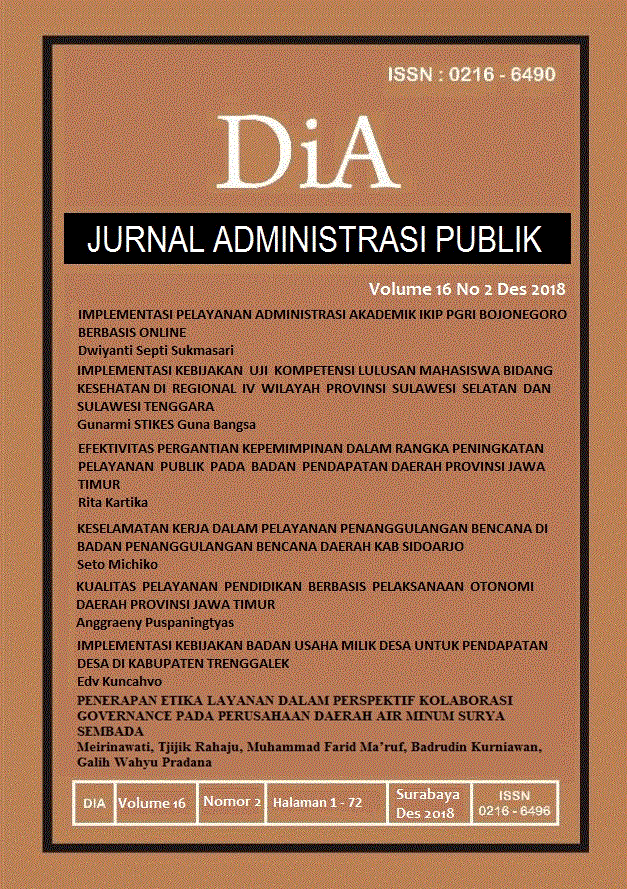IMPLEMENTASI KEBIJAKAN UJI KOMPETENSI LULUSAN MAHASISWA BIDANG KESEHATAN DI REGIONAL IV WILAYAH PROVINSI SULAWESI SELATAN DAN SULAWESI TENGGARA
DOI:
https://doi.org/10.30996/dia.v16i2.1919Keywords:
Policy Implementation, National Competence TestAbstract
Health workers human resources is a milestone in the success of health services. Recognition of graduate competence is competence certificate by act No. 12 of 2012. Health workers human resources have been complete national competence test obtained competence certificate which is consitute of quality skill grade for further training and guarantee the school of health science graduate. Regulation No. 12 of 2016; determine supplementary factor and inhibiting factor in national competence test implementation; and create the policy model of national competence test implementation in guarantee of health student. Design of research used qualitative descriptive approach. The respondent is school of health science in Makasar region. The primary data collected through interview, observation, and documentation. Data analysis used qualitative data analysis. Result of this research is : 1) Implementation of competence certificate policy which refers to ministerial of high school regulation No. 12 of 2016 inconsistent with mandate of act No. 12 of 2012 about high school, act No. 36 of 2014 about health workers, and ministerial of high school regulation No. 44 of 2014 about high school national standard. 2) Supplement factor of implementation competence certificate policy is the enachment of competence certificate policy in form ministerial of high school regulation, therefore must be implementing appropriate by the policy. While inhibiting factor of implementation competence certificate policy is refers to variable of Van Meter and Van Horn theory that showed low policy performance, therefore involved on disparity quality of learning has an impact on rate of re-taker increase. 3) Models of competence certificate policy which is still being centralistic implemented, therefore necessary to reconstruct competence certificate policy by exit-exam models with principle of integrated, synergistic, transparent, controlled, and accountable.
Downloads
References
Abbasi, N. (2013). Competency Approach to Accounting Education. A Global View. Journal of Finance and Accountancy.
Asmawi, M., Rosul. (2005). Strategi Meningkatkan Lulusan Bermutu di Perguruan Tinggi. Sosial Humaniora, Vol. 9, No. 2, h. 66-71.
Bardah, Z. (2012). Implementasi Kebijakan Akreditasi dan Sertifikasi Pelatihan di Bidang Kesehatan. Tesis Fakultas Kesehatan Masyarakat Universitas Indonesia
Edward III, Geroge, C. (1980). Implementing Public Policy. Congressional Quarterly Press: Washington.
Hapsari, M., I. & Kristiani, A., (2015). Strategi Peningkatan Kualitas Layanan Peserta Didik Kursus Bidang Vokasi (Studi Di Lembaga Pendidikan Profesi Graha Wisata Semarang). Journal of Non formal Eduacation, Vol.1, No 1.
Irwanti, Y., D. (2014). Evaluasi Uji Kompetensi Siswa Keahlian Multimedia di SMK se-Kota Yogyakarta. Jurnal Pendidikan Vokasi, Vol 4, No. 3.
Novia, Dyah, R., M. & Putri, D., W. (2016). Ini Tujuan Uji Kompetensi Nasional Tenaga Kesehatan. http://nasional.republika.co.id. [Diakses tanggal 06 April 2016, pukul 17:27 WIB].
Purnamawati, (2011). Peningkatan Kemampuan Melalui Pelatihan Berbasis Kompetensi (Competency Based Training) Sebagai Suatu Proses Pengembangan Pendidikan Vokasi. Jurnal MEDTEK, Vol. 3, No. 2.
Ramadhan, N. (2013). Studi Analisis Penerapan Metode Non OSCA dengan OSCA Terhadap Kelulusan Uji Kompetensi Mahasiswi Diploma III Kebidanan STIKES Ubudiyah Banda Aceh Tahun 2012. Jurnal Ilmiah STIKES U’Budiyah, Vol.2, No.1.
Ratnata, I., Wayan, (2012). Konsep Pemikiran Dalam Pengembangan Pendidikan Vokasi Untuk Menghadapi Tuntutan Dunia Kerja. Seminar Internasional: Peran LPTK Dalam Pengembangan Pendidikan Vokasi di Indonesia
Renaningtiyas, E., (2013). Analisis Pelaksanaan Kebijakan Manajemen Berbasis Sekolah dalam Peningkatan Mutu Pendidikan di SMPN 1 Madiun. Jurnal Kebijakan dan Pengembangan Pendidikan Vol. 1, No. 1, 14-17.
Van Meter, D., S. and Van Horn, C., E. (1974). The Policy Implementation Process: A Conceptual framework.Administration And Society. February
Downloads
Published
How to Cite
Issue
Section
License
The DiA journal allows authors to retain the copyright of their papers without limitation. Authors may grant publishers non-exclusive publishing rights to publish articles. Granting first publishing rights to publishers also qualifies as unlimited copyright (because there are no restrictions imposed by publishers on author copyright).







